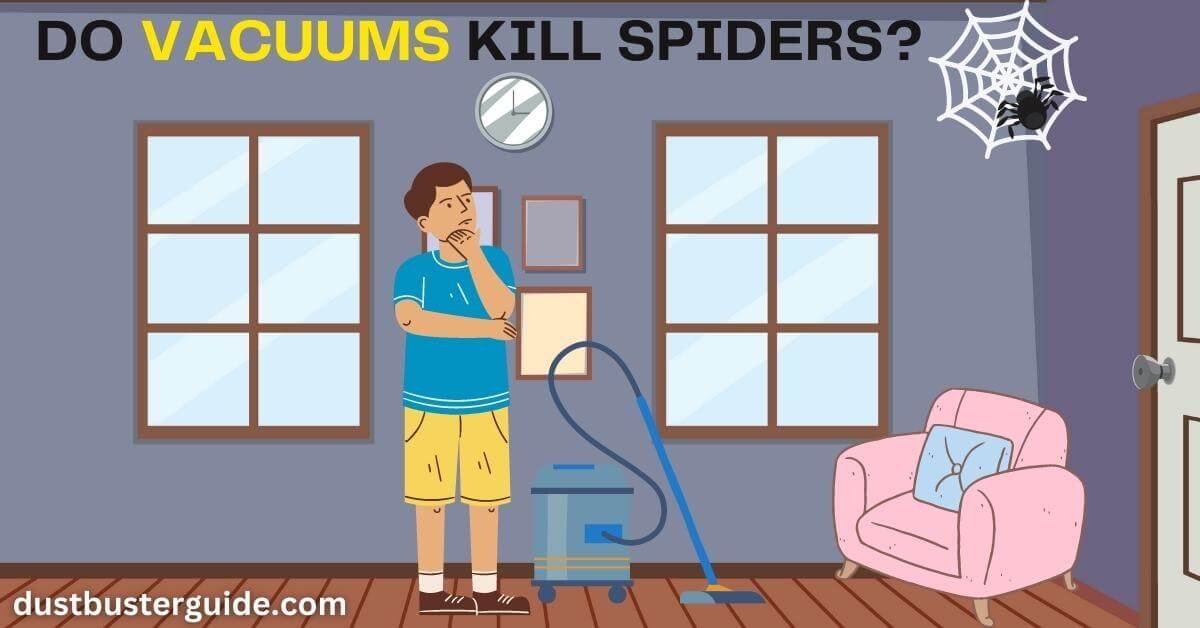Ever wondered if your trusty vacuum could moonlight as a spider assassin? Today, we’re exploring the question: do vacuums kill spiders? Picture this: your vacuum as a superhero in the battle against creepy crawlies.
But before you embark on an arachnid-sucking mission, here’s the scoop – yes, vacuums can effectively capture and remove spiders, but whether it kills them depends on factors like the vacuum’s suction power and the spider’s resilience. Join us on this pest control journey as we unveil the vacuum’s role in maintaining a spider-free zone.
Get ready to turn your cleaning tool into a spider-fighting ally, ensuring your home stays arachnid-friendly or, perhaps, unfriendly, depending on your perspective!
How Can The Vacuum Kill A Spider?
Before we go into how to vacuum successfully to eliminate spiders, let’s look at how vacuums work. Air pressure is one of the vacuum’s properties. The low air pressure may still be enough to kill the spider instantly. Or it may be high enough for the spider to withstand a significant amount of impact, which might finally kill them if they’ve been bounced around for a long enough period.
When a high-speed cyclonic machine sweeps up a spider, it appears to be moving at a breakneck pace. The speeds vary depending on the vacuum model. Modern vacuum cleaners have a computerized motor that spins at 120,000 revolutions per minute. That motor rotation rate is five times that of a Formula 1 race vehicle.
According to Maggie Hardy, a spider expert: Spiders can withstand low pressure and even low gravity. Even if a spider survives being swept into a vacuum, it is quite likely that it has suffered a catastrophic injury. It could develop to the point where the spider loses a couple of legs.
Do Vacuum Cleaners Kill Spiders – Explained
We already have said “YES” to your question, and we see you found vacuuming spiders interesting to kill them, so you’re here to learn how to accomplish it. Right! You’ve come to the correct place. Below we’ve described the ideal way to get rid of this critter based on the type of vacuum and the type of spider. So let’s find out:
Types Of Spider
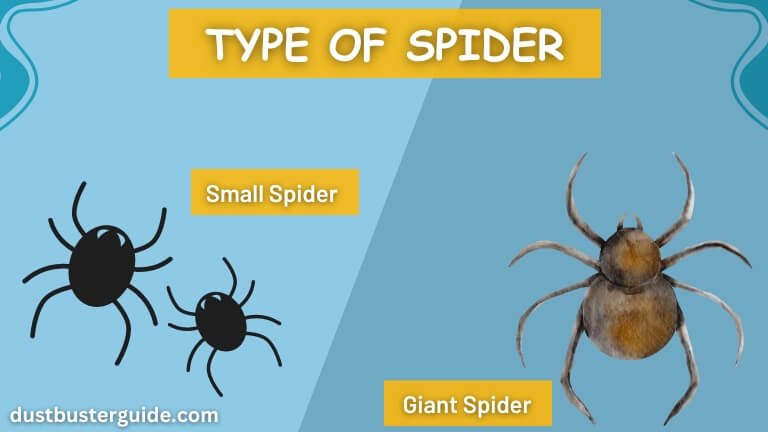
Before you pick your vacuum or decide to kill that pesky critter, you should know what kind of spider it is. Like other common arthropods, spiders have various body sizes and the rigidity of their exoskeleton, or the outer “shell” that protects them from external forces. So techniques to kill them by vacuuming also vary.
Small spiders perish immediately because their frames are too frail to withstand the vacuum’s strong suction capacity and swiftly moving bristles. It’s most likely to be dead as a result of shock and trauma. So, allow the vacuum to run longer than necessary, to be sure.
The suction may not kill giant spiders as easily, but they may lose some limbs. Aside from that, the shock experienced throughout the process will undoubtedly hinder them. If that isn’t enough, the density of dust and filth accumulated in the new surroundings will also work against them. If they survive at all, they will almost certainly die of suffocation.
Types Of Vacuum
Regarding spiders, the type of vacuum cleaner you use is important. A traditional vacuum cleaner that sucks everything directly into a bag is more efficient than one that sucks everything into a filtered canister. A vacuum cleaner with a hose may also suck with better precision and accuracy.
Bagged vacuum: A bagged vacuum cleaner may be better for this cause. It must first survive the rotating brush roll. If it survived the vacuum’s brush roll, or if your vacuum doesn’t have one, the spider may have survived! The density of dirt, dust, and hair in a full bag is likely to suffocate the spider. It’s far more difficult for a spider to get out of a bag, and the spider will finally die of thirst. There’s also the possibility that other critters are also there, and they can and will eat it.
Bagless Vacuum: Because you won’t have to buy replacement vacuum bags, a bagless vacuum may eventually be a cheaper and more sustainable solution. The disadvantage of employing this type is that it gives a spider a better chance of survival within the container, where it may not suffer as much suffocation as a spider would in a dark, dusty vacuum bag. The good news is that you can see through the canister because it lacks a bag, allowing you to detect the vacuumed spider and assess the situation.
Dyson V6 HEPA – As An Efficient Vacuum Cleaner
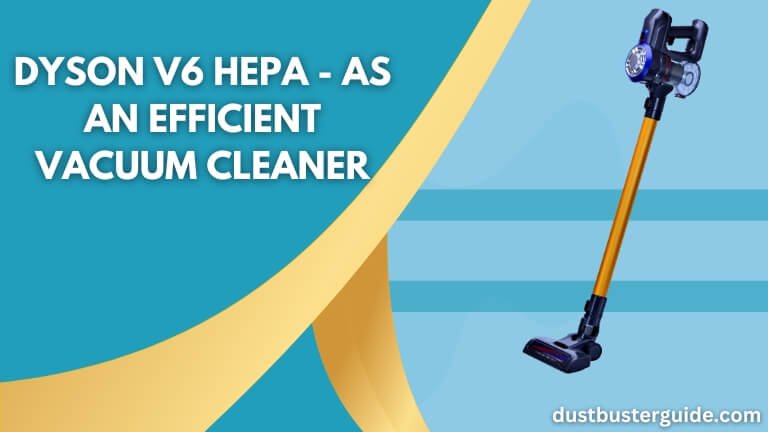
We recommend the Dyson V6 HEPA cordless vacuum cleaner as an example of an effective spider vacuum cleaner. It is light and not constricting. The best feature is its power and cordless convenience, which allows you to act rapidly whenever and wherever you need to.
The next greatest thing is its broad range and adaptability. It quickly converts into a portable solution with a range of length possibilities. It delivers whether you clean the floor or the ceiling. When choosing a vacuum, keep in mind the various applications it may have. When dealing with spiders, both power and comfort are essential.
Method Of Vacuuming Spider
So when you find out what types of vacuum you have and what type of spider you want to kill, make sure you do the procedure right. So here is the step-by-step guide:
Vacuum the spider with a low-speed handheld vacuum and cover the vacuum nozzle with a cloth. Now step outside and let the spider run wild. When you’re through cleaning, throw away the vacuum bag if it has one. Replacement bags are reasonably priced. If the spider manages to crawl out of the bag, it will end up in the trashcan! But if your vacuum has no bag, empty and rinse the dust cup. Some individuals suggest vacuuming a small bit of baby powder before and after vacuuming to suffocate them.
After vacuuming, quickly dispose of the vacuum bag, ensuring that whatever is within the bag remains inside. Although rare, a few creatures occasionally survive the sucking and smothering process. Any bugs or spiders that try to escape are trapped by removing the vacuum bag and placing it in a plastic waste bag. A death sentence is secured by carefully sealing the bag and disposing it in an outside trash container.
We propose utilizing a vacuum with a beater bar brush. The power of the brush can kill the spider if it is on the ground. Moreover, do not try to lift your entire vacuum against the wall; only do this if the spider is on the ground. Placing the vacuum up against the wall can seriously damage the wall and ruin it! So we suggest you avoid doing so!
How Long Can A Spider Survive In A Vacuum
So that you have acquired the answer to your question: do vacuums kill spiders. Another confusion must have come into your head: how long can a spider survive in a vacuum, right? While we have already established that vacuum cleaners can readily kill spiders of all sizes, let us dig more into this topic:
Most spiders die when you vacuum them. They may die instantly due to the stress of being swept into the vacuum cleaner or hunger. Spiders may lose one or more legs if the vacuum cleaner has a revolving brush. However, whether or not a spider survives a vacuum cleaner is determined by the type of vacuum cleaner and the type of spider we already stated above.
Secondly, even if spiders avoid the initial “vacuuming”, they have a very low chance of surviving because most vacuum cleaners include a HEPA filter system that prevents particles from returning.
How Long Should You Run Your Vacuum To Make Sure The Spider Is Dead?
Running the vacuum for a few minutes should be sufficient to ensure that a spider is no longer a threat. The vacuum’s suction power is typically strong enough to capture and contain the spider quickly. However, it’s important to exercise caution and prioritize safety when dealing with spiders.
If you’re trying to remove a spider from an area and are concerned about its well-being, consider using alternative methods such as gently capturing it with a cup and paper and releasing it outdoors. This way, you can avoid harming the spider while addressing any potential concerns.
Keep in mind that most common household spiders are not harmful to humans, and they play a beneficial role in controlling other pests. If you’re unsure about the type of spider or have concerns about venomous species, it may be advisable to contact a pest control professional for assistance.
Can Spiders Crawl Their Way out of Vacuums?
So you realized that a spider could survive in a vacuum, which suggests that surviving spiders may attempt to crawl out of the Hoover at some point. This escaping can happen in many ways:
- If you leave your machine turned off and unattended for an extended period, the spider will emerge through a hole in the canister, the vacuum bag, or the suction hose.
- A person inadvertently moves the vacuum cleaner, causing the spider to tumble out while it is still on.
In that scenario, it is best not to prolong their confinement inside your vacuum bag and instead quickly dispose of it, and all its contents in the rubbish can go outside your house. After all, you don’t want those pesky creatures back in your house after spending the day sweeping them. Is that right?
Do Vacuums Kill Spiders? Alternative Ways
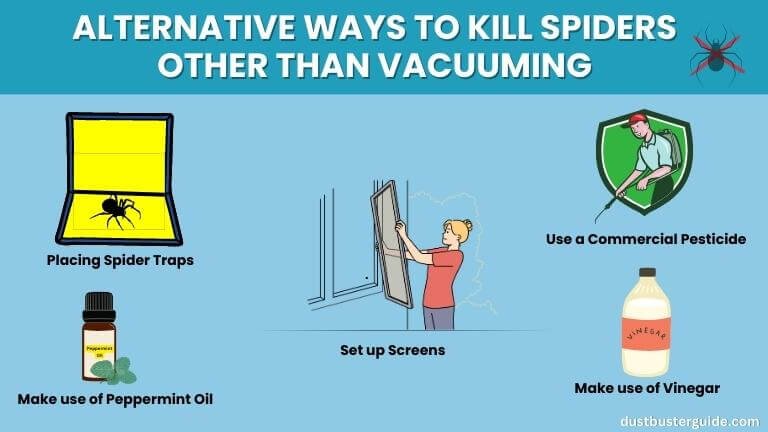
Though vacuuming is the best and easiest way to get rid of spiders in your home, several options can help you get rid of them if your vacuum is broken or in need of repair. So, to get freedom from those clingy spiders in your house or apartment, try the following ways:
Placing Spider Traps
Sticky glue traps that capture and kill spiders are quite an effective method to get rid of spiders if you place them in areas with high traffic. These spider traps are available over the counter at home and garden retailers. Inspect and replace them frequently, and keep kids and pets away.
Use A Commercial Pesticide
The baseboards, corners, and under furniture are the targeted usage areas for store-bought insecticides and spray treatments. By creating a barrier, these chemicals hinder or kill spiders. They can be very useful for controlling large spider infestations. Use them carefully and consider all label cautions because many contain chemicals or toxins dangerous to children and pets.
Make Use Of Peppermint Oil
Numerous home methods are available to get rid of spiders without using chemicals. Peppermint oil is one of the greatest. Peppermint oil repels spiders due to its pungent aroma. For the best results, mix 15–20 drops of essential oil with a spray bottle of water before misting it where you’ve seen spider activity.
Make Use Of Vinegar
Vinegar is a wonderful natural spider repellant to eliminate spiders without killing them or using pesticides. Spray a mixture of a half-full spray bottle of white vinegar and water into the corners of your house or bedroom to scare away spiders. Reapplication of this spider spray every few days will work best.
Set Up Screens
Install screens to prevent bugs if you leave your windows and doors open throughout the day. To prevent the development of holes, maintain the screens annually.
| Method | Description |
|---|---|
| Catch and Release | Trap the spider with a glass and paper, then release it. |
| Bug Spray | Use spider-specific insecticides to kill them on contact. |
| Shoe Squash | Simply squash the spider using a shoe or other object. |
| Natural Repellents | Deter spiders with essential oils like peppermint or vinegar. |
| Spider Traps | Place sticky traps designed for spiders in common areas. |
Is Killing Spiders Unethical?
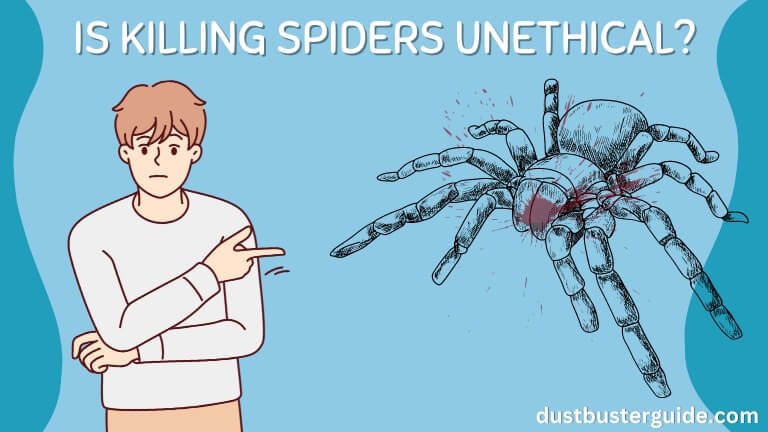
While you’re deciding whether or not to get your vacuum out and kill that pesky spider, You may have wondered if killing spiders is unethical, remembering your grandmother’s superstitious instruction to not kill them.
So, do you have to vacuum spiders and kill them just because you don’t want them in your house? Wouldn’t letting them live and crawl through the grass outside be enough and the right thing to do? So, the decision is entirely yours. After all, there are very solid justifications against vacuuming and killing spiders. Spiders, for example, serve as predators of insects that infest your homes, such as flies, mosquitoes, and moths. Aren’t they doing you a huge favor?
It is not to dismiss your potential arachnophobia or spider phobia. However, experts advise trying to capture them first instead of killing them. You can accomplish this by using less suction power on your Dyson and releasing it outside (as far from your house as possible).
Secondly, there is nothing wrong with getting rid of spiders in your home because they are intruders and uninvited, housebroken guests. They can be deadly to your children and pets depending on the type of spider that becomes a part of your home décor. Removing them might be wiser than applying salve to your guilt later.
However, you can also use a spider catcher. Get a spider catcher if you want to remove spiders from your home without killing them. A hand-operated wand known as a “spider catcher” captures spiders in fine, flexible threads and holds them until you release them outdoors. It does wonder when you combine a spider catcher with all-natural treatments like peppermint oil and vinegar.
Again, the ultimate decision to kill or let them live is yours. Taking any required precautions to control a spider infestation, on the other hand, is entirely acceptable and makes perfect sense.
Preventive Measures To Keep The Spiders Away
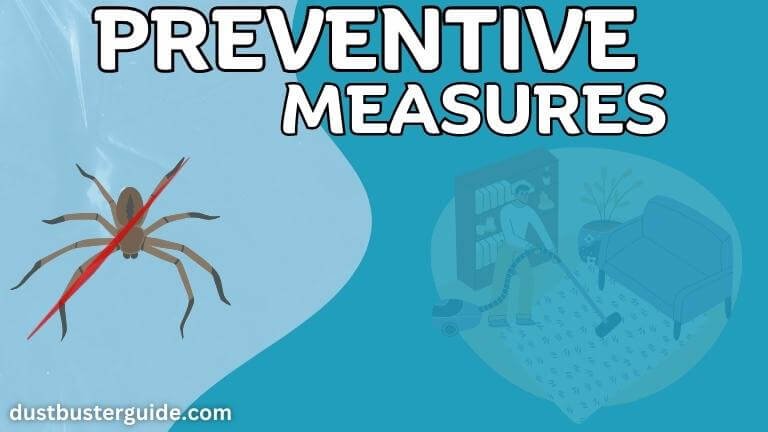
We’re sure there’s no confusion about does vacuuming kill spiders. Even yet, you must be ready in advance to remove the spiders from your home if you want to avoid finding yourself in a position where you must choose between following your grandmother’s advice and removing the spiders from your home. You can ease your life in that situation by taking a few precautions.
We’ve all seen people make the mistake of assuming that vacuuming will scare the new spiders away. It, however, is not the case. Spiders are as fearless as they are frightening to us. So, the following are some practical preventive measures that will assist you in keeping those tiny creatures away from your home:
- The truth is that spiders will return if the factors that drew them to your home in the first place are not addressed. Food is one of the most common. Spiders feed on other insects found in your homes, such as dead flies, mosquitoes, and moths. As a result, aim to keep your home as insect-free as possible.
- Another effective preventive measure is to decrease clutter. It can make a major difference because, with fewer hiding spaces, spiders may choose to settle in on the ceiling, making them easy to identify.
- Remove spider webs from your home using a vacuum with a hose attachment. It would be best if you did this as soon as you notice one around your house.
- If everything else fails, an indoor insecticide can assist you in dealing with more threatening spiders, whether you can identify them as potentially harmful. Apply it to crevices and gaps where spiders generally move through. This way, you are not only allowing spiders to die from this but also inhibiting other spiders from emerging. Caution is advised, as spraying chemicals straight onto a spider marching along the wall may not be the best method. It is better suited as a preventive strategy.
You can also learn about some of the preventive measures you must take to keep the fleas infestation away by clicking here.
Conclusion
Finally, we can confidently say that we have answered your question: do vacuums kill spiders? And you must be motivated to try this because you now know that if you vacuum up a spider, it will almost certainly die. Its escape possibilities are extremely limited. Remember that if they are fortunate enough to survive, they can flee as you empty the dirt container or sack. However, if the spider survives, it is a significant possibility that it will suffer serious damage due to the air pressure and the traveling dirt and debris particles. However, regardless of the vacuum used, the chances of a spider being killed while sucked are quite high.
FAQs
Does vacuum suction kill spiders?
Spiders and bugs with more fragile bodies that lack an exoskeleton are more likely to be killed by the suction. The dirt within will smother them if they get into the vacuum bag. Bugs that survive the suction and remain alive in the vacuum bag can crawl out.
What vacuum is best to kill spiders?
If you’re looking for the best vacuum for sucking up spiders, go no further than the Dyson V6 Motor Head Cord-free Vacuum. This versatile vacuum has a wonderful reach and is battery-powered, making it incredibly easy to reach those bugs.
Can you vacuum spider eggs?
Unless you’re sure, you’re dealing with deadly spiders, vacuuming their egg sacs is an effective and possibly one of the finest things you could do. Just make certain that you do it right. Otherwise, you risk releasing a new generation of spiderlings, which will multiply even further in every nook of your small dwelling.
Can spiders escape from a vacuum cleaner?
It can, depending on the vacuum cleaner. If there is a clear path out, the huntsman may be able to flee when the suction is switched off. That is, provided the spider survived being pulled up, there are surfaces on which it might adhere, and holes are large enough to squeeze through.
How do you get rid of spiders if you’re scared?
The spiders will perish rapidly if sprayed with enough Windex. If you’re scared, you can spray from a distance, but ensure you get a good amount on the spider before running away and attempt to monitor it so you can find the spider and remove it after it has coiled up.
What to do if someone is bitten by a funnel web spider
If someone is bitten by a funnel web spider, seek immediate medical attention, apply a pressure immobilization bandage, and keep the person calm until help arrives.
How long can a house spider live without food?
House spiders can survive for several weeks without food, as they are adapted to endure periods of scarcity.
External Resources
- Suck Up The Mess: The Benefits Of Using A Car Vacuum Cleaner – 91Wheels
- Design And Development Of A Low Cost Handheld Vacuum Cleaner – ResearchGate
Assessment Of Vacuum Cleaners And Vacuum Cleaner Bags Recommended For Allergic Subjects – ScienceDirect - Microbial Contents Of Vacuum Cleaner Bag Dust And Emitted Bioaerosols And Their Implications For Human Exposure Indoors – ASM Journal Platform

